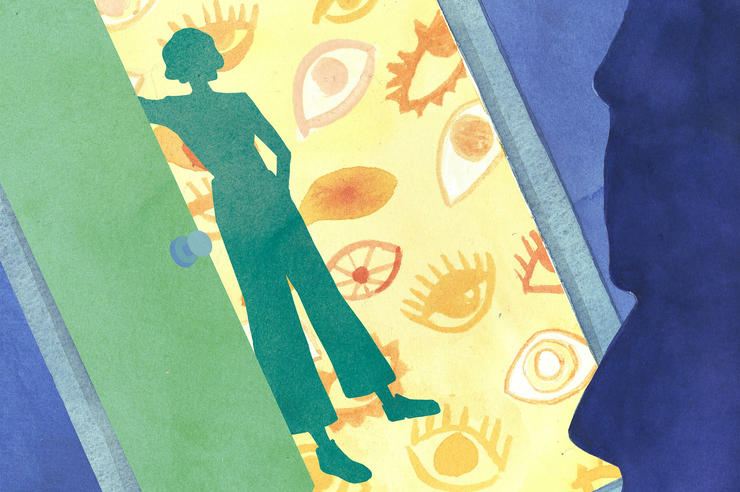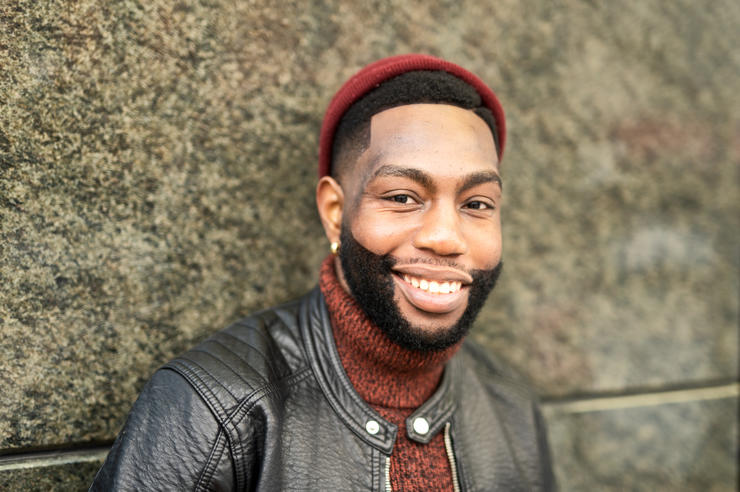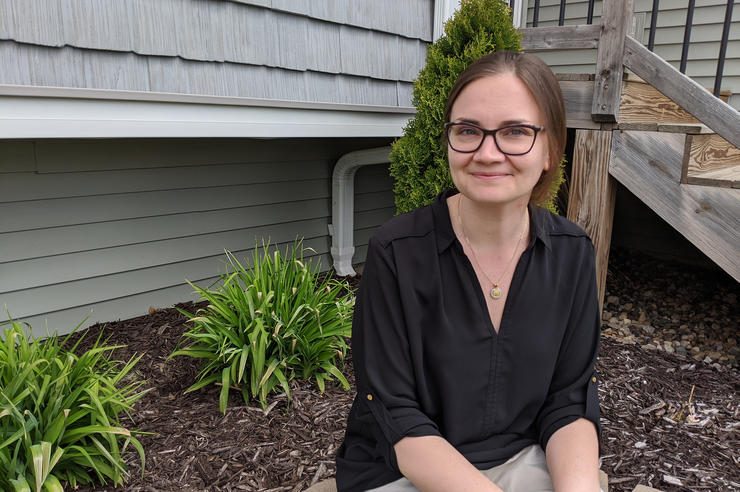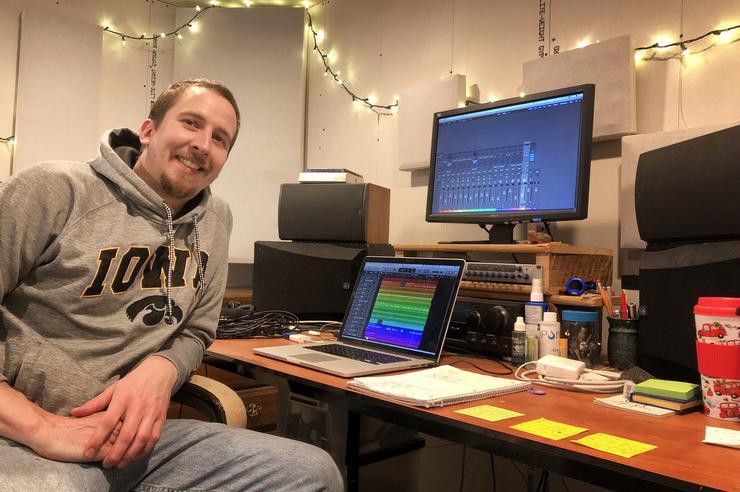Iowa: Nation’s next hotbed for jazz
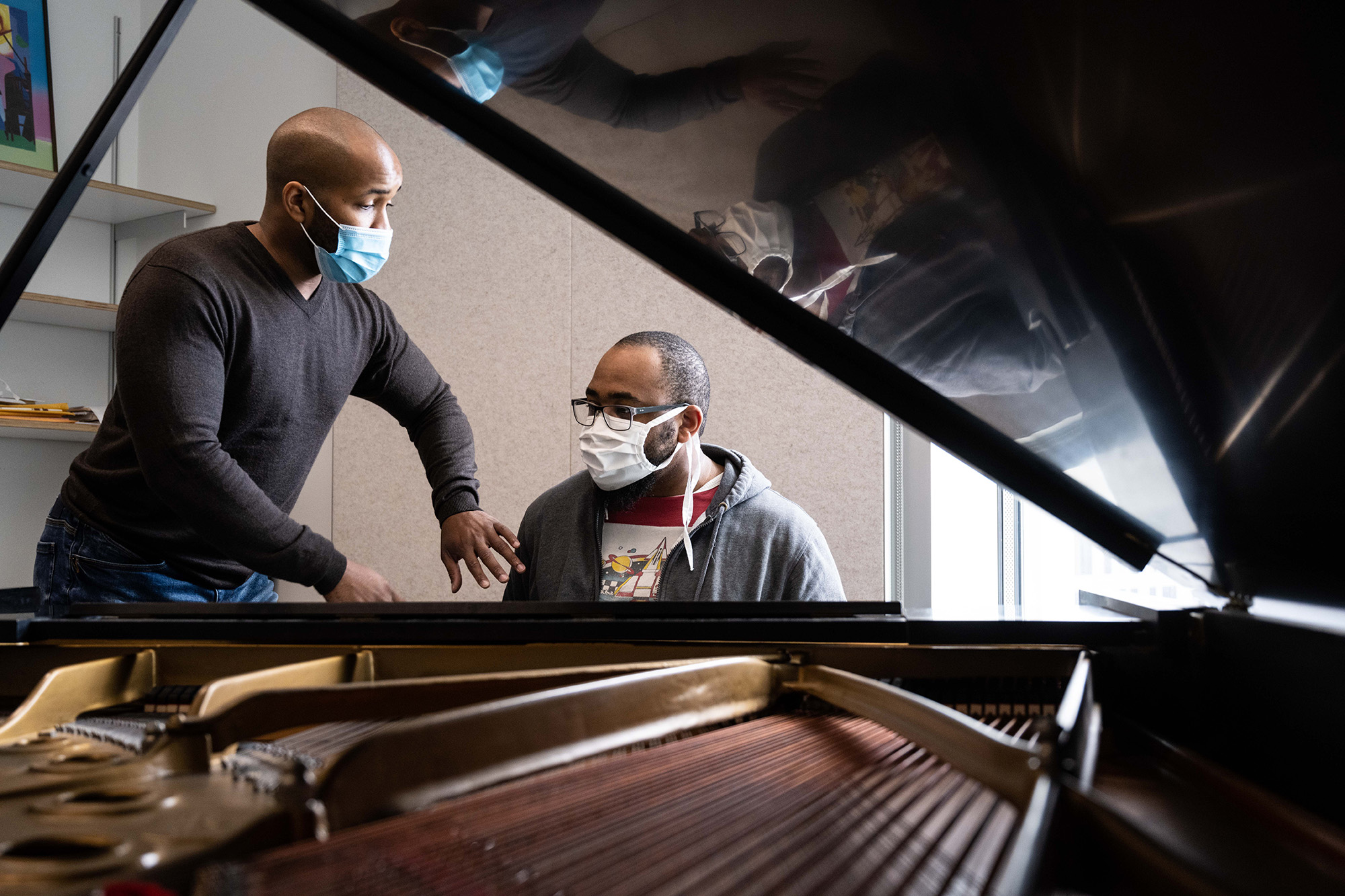
Damani Phillips and William Menefield say they never expected to end up in Iowa.
“Iowa was not on my radar,” Menefield says. “The last time I checked, the state was not a hotspot for jazz. I almost needed a map to remember where Iowa was.”
The jazz musicians and professors in the University of Iowa School of Music are determined to put Iowa on the map for future jazz educators and students.
“The goal is to establish ourselves as a national powerhouse of jazz studies,” says Phillips, associate professor and head of the jazz studies program. “Iowa currently is not always the place that people think of when they consider where to go to school for jazz studies, but if the quality of what you build is strong enough, people will come to get the training that they need.”
Phillips started at Iowa in 2013 and was named head of the jazz studies program in 2019.
“Dr. Phillips has a really strong vision about how jazz at Iowa is going to set itself apart from other programs,” says Tammie Walker, director of the School of Music. “He’s building upon the rich history of the program here, but also taking it in a different direction at a really fast pace, which has already been exciting. I really believe we are poised for an incredible transformation and surge of impact in the jazz area.”
Faculty leading the way
Part of that change in direction comes from an influx of new faces in the program. Menefield started in fall 2020—filling a hole left after John Rapson, who was previously head of jazz studies, retired. The program will welcome another new faculty member in fall 2021, award-winning trumpeter Curtis Taylor—who will take over after Steve Grismore retires.
“The faculty are the heart and soul of any school,” Walker says. “And I think we’re able to put ourselves up against the top schools in the country based on the people that we have here. I firmly believe that we have a world-class team of leaders in the jazz field.”
Marvin Truong, a first-year student working toward a double major in jazz studies and business, says he appreciates the expertise and musical diversity of the faculty. Iowa started its undergraduate degree in jazz studies in fall 2019, with the first student graduating in spring 2020.
“The thing about jazz is every single person plays it differently,” Truong says. “So, Professor Phillips plays completely different than Professor Menefield. And he plays completely different than Professor (James) Dreier, who plays completely different than Professor Grismore. It’s cool because then I get different perspectives on everything.”
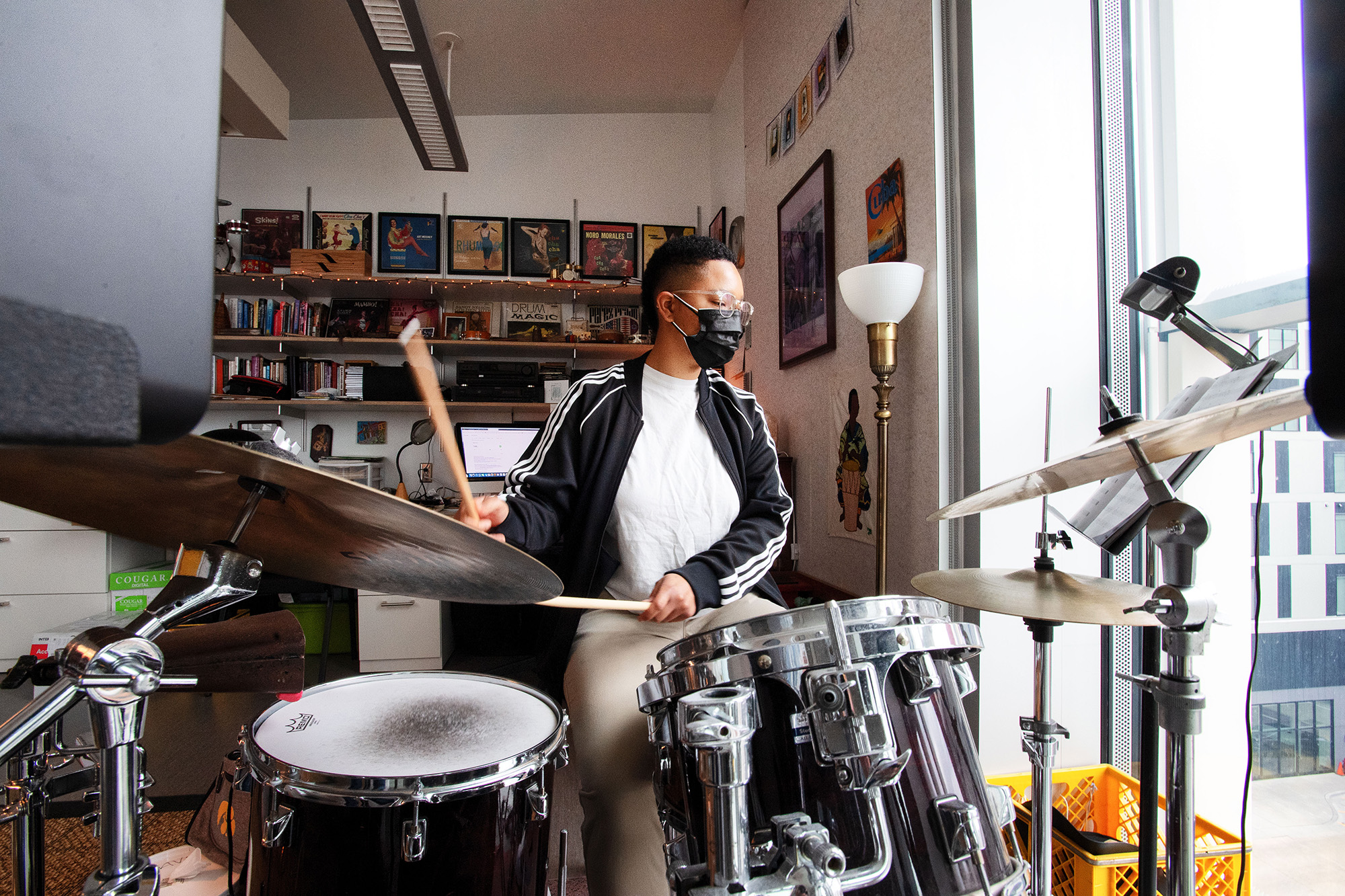
Giauna Neville got her bachelor’s degree in music education and wanted to study jazz more in depth. While looking at master’s programs, a friend and fellow percussionist, Cassius Goens III, suggested Iowa, where he got his master’s degree.
The Indianapolis, Indiana, native says the faculty at Iowa opened her eyes to musical styles she never expected to fall in love with.
“I study with Professor Dreier, whose focus is Latin music, and my Latin chops certainly weren’t up to par when I came here,” Neville says. “But I’ve since discovered I love and have a natural affinity for Latin music. I’m even considering a career joining a Latin band. Learning things like that about yourself is priceless.”
“The goal is to build something special, something that is bigger than a run-of-the-mill jazz studies program, a program that has national and even global impact. Those are the kinds of things that I have always wanted to be a part of. I’m very excited it’s happening here.”
Accessibility to faculty a top priority
One thing that isn’t expected to change within the Iowa jazz studies program is a student’s ability to get plenty of one-on-one training with their professors.
“We’re never going to be a machine-like program like some others; we could be, but I’d fight against that with every ounce of my being because it comes at a cost,” Phillips says. “In a creative environment, we have to know students intimately on a musical level, and if you’re one of a million students who comes through my office in a given week, the likelihood of that happening is far lower. We don’t want students to feel like nothing more than a cog in a big machine.”
Menefield, assistant professor in the jazz studies program, says he couldn’t agree more.
“Relationships matter. Relationships matter. Relationships matter,” Menefield says. “I said it three times. They are absolutely paramount to the success of any program. If you can establish a quality rapport with your students from the moment they come in, you can build upon that over time. Then there is a much greater chance that they will feel comfortable with being more vulnerable with you as far as questions they may have or the challenges they may be facing. Then I can adjust my curriculum or teaching style according to their needs.”
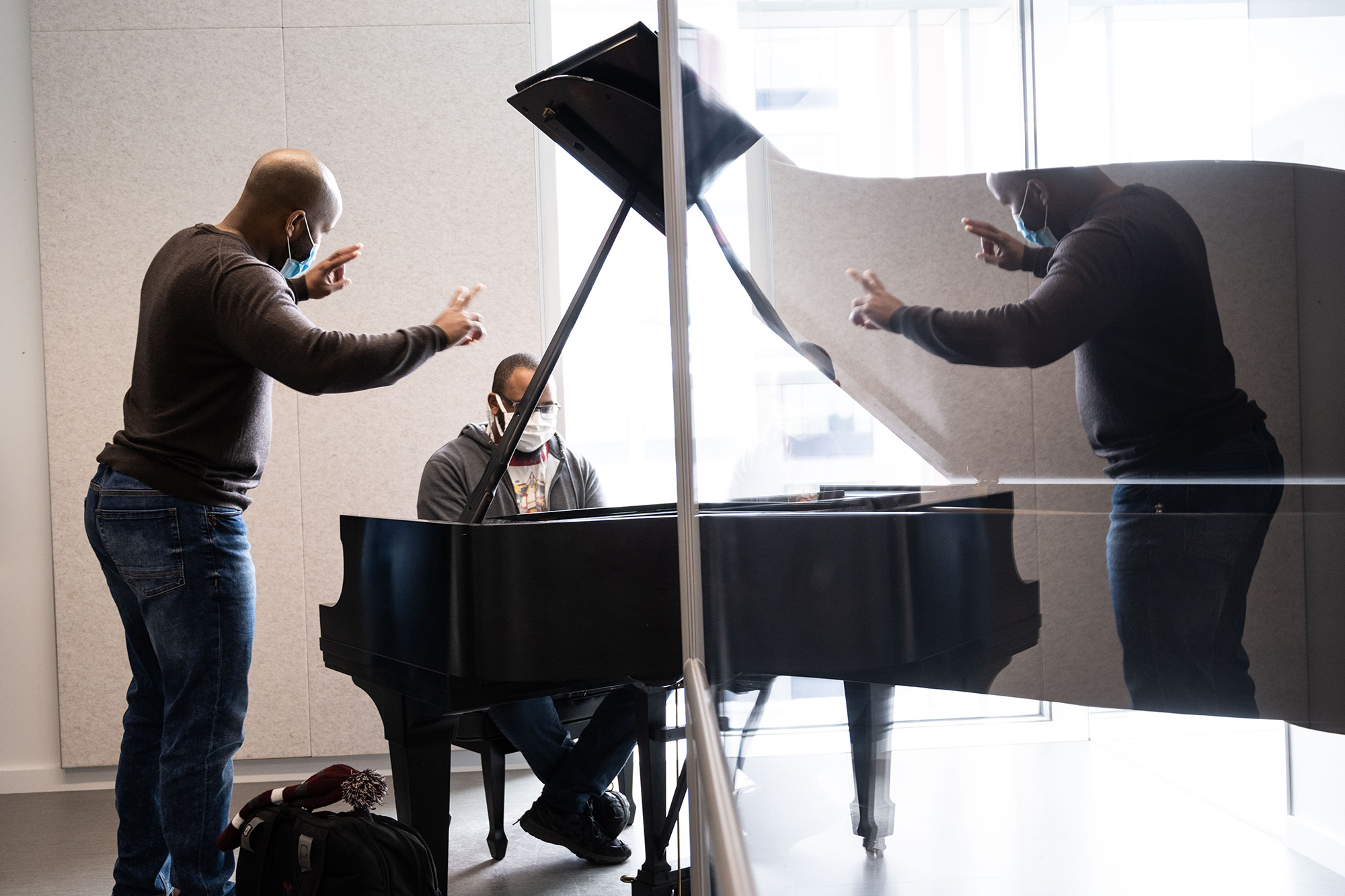
Neville says she appreciates the fact that she can speak openly with faculty about anything.
“A lot of conversations over the past year have been racially driven because that’s just the nature of what has been going on, and I didn’t feel awkward,” Neville says. “I could say how I felt as a Black person and have a different perspective from, say, Professor Grismore, and it wasn’t weird. It was just an honest conversation.”
Easy accessibility to faculty was a main reason Truong chose Iowa. As a high school student in Waukee, Iowa, he went to several prestigious jazz camps across the country, but says Iowa’s stood out.
“Iowa’s camp honestly was the most beneficial for me because there was just so much one-on-one time,” Truong says. “I never felt like I was just a kid in the crowd. The professors really made me feel like I was important, and it really stuck with me. I knew I would get that kind of experience when I came here.”
Preparing students for many career paths
Phillips says the function that jazz musicianship plays in 2021 is different than it was 15 or 20 years ago.
“Back then, you could be a very fantastic bebop jazz player exclusively, and that would be fine,” Phillips says. “But because the training that’s offered is usually either classical music or jazz, jazz studies has become a potential source for filling all manners of roles in popular music beyond just straight-ahead jazz, such as hip-hop, R&B, funk, and soul. So, we’re focusing our energies on trying to train musicians for contemporary music markets.”
To prepare students, the Iowa faculty focus on developing well-rounded musicians who, depending on their goals, are not only masters in their instrument but also ready to continue their education, teach others, play professionally, and navigate the business side of the profession.
“You may want to go down one path, and we will get you ready for that,” Phillips says. “But paths B, C, D, and E are also likely to be in your future, so let’s make sure that you don’t walk into those situations blind either.”
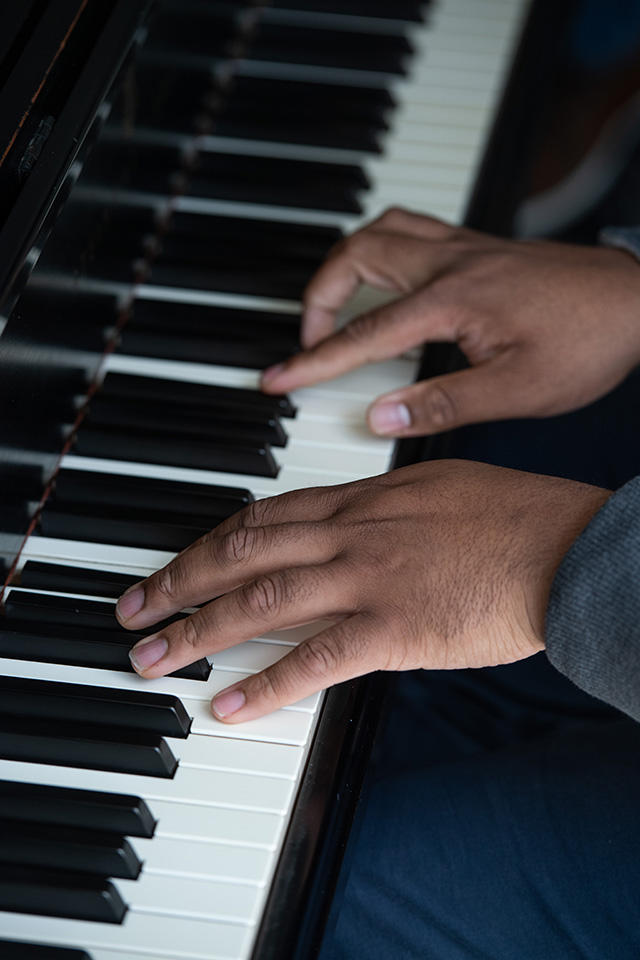
The University of Iowa School of Music offers the best of both worlds—a small, highly selective program within a large, world-class learning environment. You’ll develop your musicianship by performing, composing, and innovating through technology, plus have the benefits of a broad-based, comprehensive education from one of the nation’s top universities.
The jazz studies program is designed to give students the skills necessary for life as a working jazz musician or continuing on with academic study. It includes numerous large and small ensembles, and a comprehensive slate of courses in history, improvisation, and establishing a professional presence beyond the program.
Neville says she has learned more about jazz and the music industry than she ever expected.
“I’ve not only learned how to play the music, but everything from the history to booking gigs to managing a website; I’ve learned all of this in the two years that I’ve been here, and I’m still learning,” Neville says.
Truong says he has appreciated the real-world applications that are integrated into classes.
“Professor Phillips will give us a tune and we’ll get maybe 10 seconds to look at it before we start,” Truong says. “I’ve been fortunate to sub in for some big bands, and that’s what happens. I wish I had had those lessons beforehand!”
One of the unique aspects of Iowa’s jazz master’s program is the option to create a capstone recording project in lieu of a written master’s thesis, an alternative usually designed almost exclusively for doctoral students.
“When you leave here, you’ll have a completed recording project in hand to do with as you see fit,” Phillips says. “It’s just one more arrow you’ll have in your quiver.”
Menefield says he sees great value in a written thesis, but he loves the practicality of a capstone recording project and how it can prepare a student for the professional world.
“When they graduate, they can say, ‘I know what that feels like. I have skills and experience doing that,’” Menefield says. “Professional groups will be able to say, ‘They graduated from the University of Iowa jazz studies program, so we know they’re going to be ready. We know they will be a great player.’”
Jim Buennig got his master’s degree in jazz studies at Iowa and says he appreciated the chance to write, produce, and record an album while he was a student.
“Writing a research paper is fine, but if you’re getting a performance degree, it makes a lot of sense to be set up to function professionally and have an album under your own name,” says Buennig, who was a visiting assistant professor on campus in spring 2021. “Iowa was the only place that had a project like that when I was choosing a master’s program.”

Location, location, location
While what students learn within Voxman Music Building is important—and Voxman Music Building itself is quite impressive—musicians also benefit from performing outside of the university community. And while Iowa City may not be a major metropolitan area, there are plenty of opportunities to perform.
Buennig says he was surprised as a student by how much gigging he was able to do while in college.
“Iowa City has so many venues and festivals, such as Mission Creek, the Jazz Festival, Soul Festival, and Arts Festival, that you can play at,” Buennig says. “But there’s also all these small towns that are reasonably close that have venues and performance opportunities as well.”
The ability to play and attend live performances also exists just a bit farther from Johnson County—for both students and faculty.
“Iowa City is a sneaky good location because you can drive five hours or less and get to Chicago, Kansas City, St. Louis, Milwaukee, Minneapolis,” Menefield says. “There’s not a lot of cities in the nation where you can, over a weekend, have so many different spots you could hit up.”
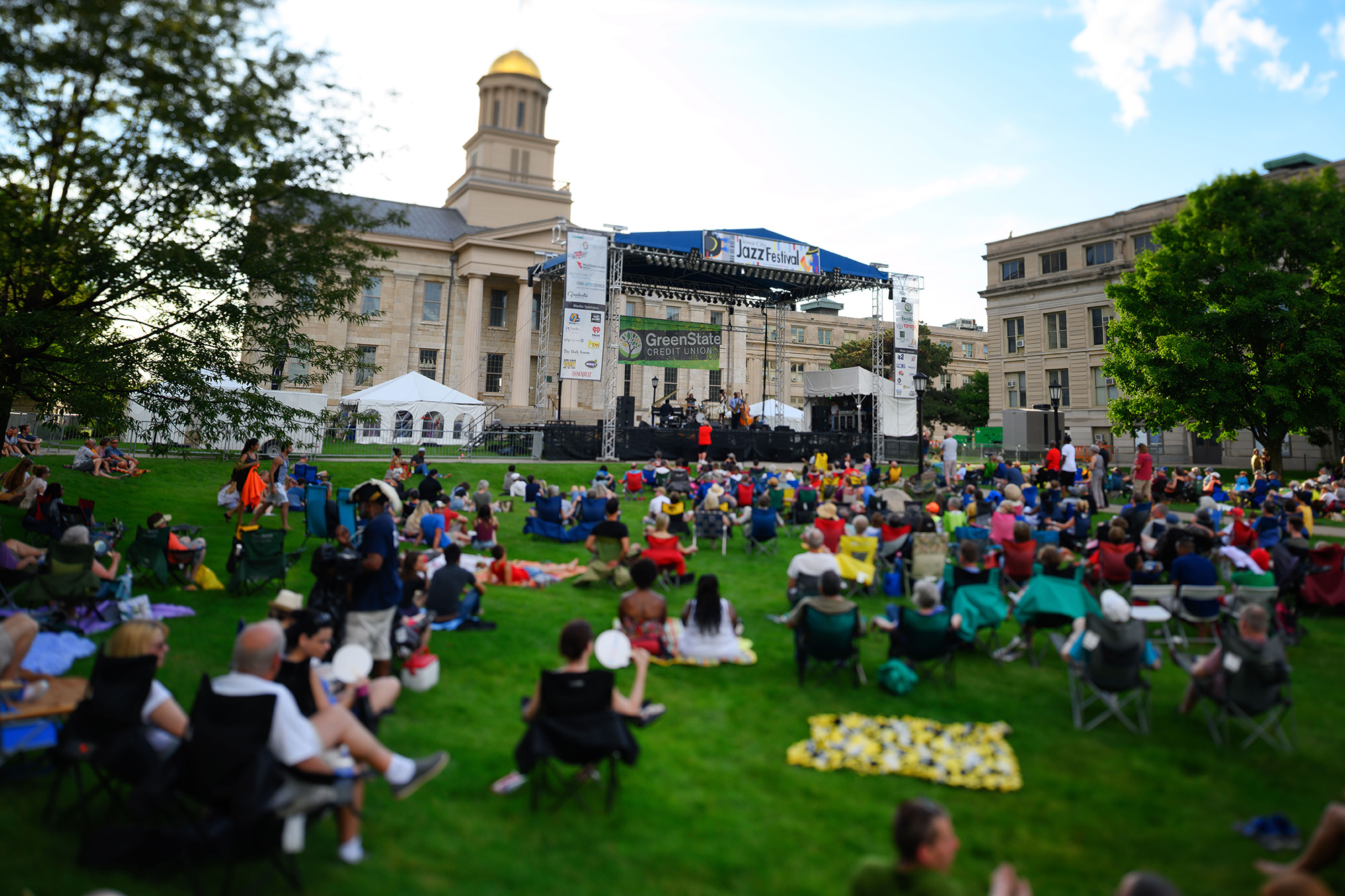
Buennig urges students to trust the faculty and program.
“This is not an easy field in which to make a living,” Buennig says. “But the Iowa professors know what they’re doing and will help you get where you need to go. Apply yourself and do everything that’s being asked of you.”
As the University of Iowa jazz studies program continues to evolve, students and faculty say they feel excited about the future.
“I’ve grown so much as a person and as a musician,” says Neville, who plans to move out West to teach after graduating in 2021. “My relationship with jazz while studying here has fueled my passion to get back into the schools even more.”
“The goal is to build something special, something that is bigger than a run-of-the-mill jazz studies program, a program that has national and even global impact,” Menefield says. “Those are the kinds of things that I have always wanted to be a part of. I’m very excited it’s happening here.”
